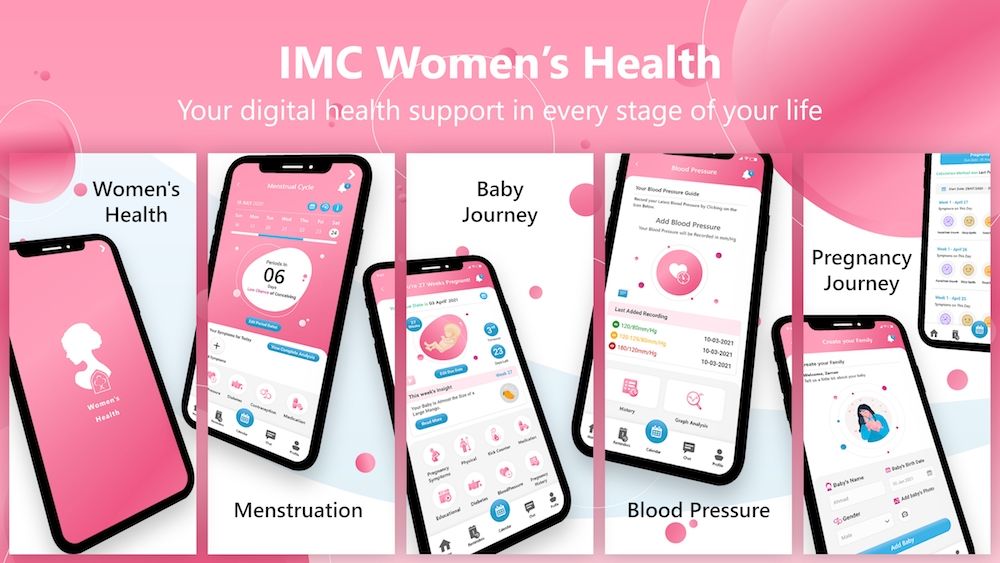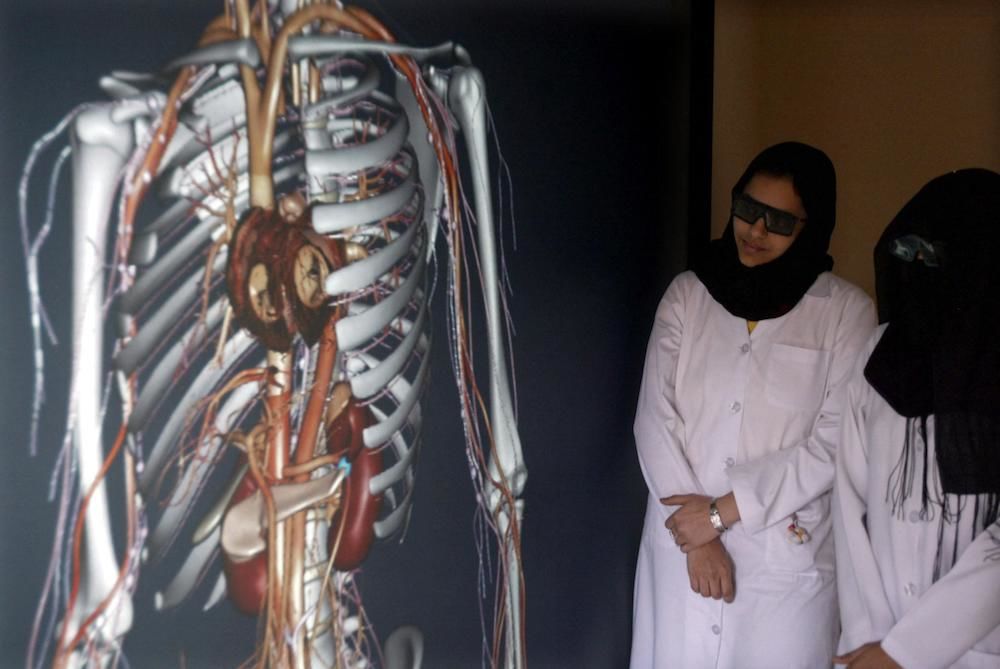
A women’s well-being app builds on Saudi Arabia’s health-tech success
The IMC women’s health app, due to launch on Nov. 1, will — according to its creators — track users’ body metrics, offering them more control over their health and promoting overall well-being.
More than just a dieting and fitness tracker, the new app also gives information on gynecology services, polycystic ovary syndrome, fertility, fatigue and hormones. It includes a calendar and calculator for menstrual cycles, ovulation and fertility tracking, as well as for pregnancy and wellness management.
“We focus a lot on wellness and well-being,” Farhaa Abdelhaq, who is in charge of the app’s design and analysis, told Arab News. “It connects to our vision of healing the mind, body and soul by taking a holistic approach. Biologically, we know that women have longer life expectancies, but that longevity does not equate to better quality of health.”
Different features allow women to predict their fertility, record and track their symptoms, and monitor contraception, blood pressure, blood sugar and medication. As Abdelhaq explained, such metrics require a service tailored specially for women to provide them with more control over the management of their health.
 A preview of the IMC Women’s Health App.
A preview of the IMC Women’s Health App.
“It’s really about dedicating a special app for their specific needs, for diseases that affect them, and to give them more opportunity and information, without visiting the doctor all the time,” she said.
“It’s about enabling and empowering patients to have information at their fingertips, which they can receive from a more (reliable) source rather than reading online.”
Available on the Apple App Store and Google Play, the app will initially be released to patients at the International Medical Center Hospital in Jeddah, where it was developed in both Arabic and English, before it is offered to women across the country and, eventually, the world.
“We will assess, based on the feedback from our patients, whether any features need to be improved,” Abdelhaq said. “There is no specific app for women to date in Saudi Arabia, so it’s important this is done for them.”
Technology geared toward women’s health, known as femtech, is a rapidly emerging industry. According to a report from Research and Markets called “FemTech Market — Global Outlook and Forecast 2021-2026,” the sector was expected to grow at a compounded annual rate of over 13 percent during those five years.
With the health care industry increasingly adopting digital tools, the report found that 80 percent of women spend money on health products and make 90 percent of household decisions related to health issues. Overall, the global femtech market linked to maternal health is expected to reach over $19 billion by 2026.
 Saudi medicine students wearing special 3D glasses listen to Egyptian
Doctor Fawzy Deghedy as he explains his new cyber anatomy technique,
which employs a virtual 3D anatomy machine, at the Saudi German hospital
in Jeddah.
Saudi medicine students wearing special 3D glasses listen to Egyptian
Doctor Fawzy Deghedy as he explains his new cyber anatomy technique,
which employs a virtual 3D anatomy machine, at the Saudi German hospital
in Jeddah.
“It’s a huge tech-based industry focusing on developing female health,” Abdelhaq said. “It focuses on very specific issues for women.
“There are a lot of stages women go through — from menstruation cycles and pre- and post-menopause, to pregnancy, postpartum and using birth control. The idea is to improve our overall well-being, and digital tools are one way we can do that.
“Women are the primary decision makers when it comes to health care, but they also have little information, or they’re misunderstood.”
Such digital tools can be especially important for women in Saudi Arabia, as they take into account travel arrangements and religious duties, such as Umrah.
“It gives them that data, information and awareness overall to have everything listed out so that, when they go to the doctor, they know what symptoms to mention,” Abdelhaq said. “It helps early diagnosis.”
In particular, Abdelhaq highlighted the app’s role in monitoring polycystic ovary syndrome, which affects fertility, weight and hormones, and can be difficult to diagnose.
The app is part of a set of digital solutions that the IMC Hospital aims to provide to women throughout Saudi Arabia.
“As health care is progressively becoming more patient-centric and personalized, it is imperative we take into account the different needs of Saudi women and use technology to ensure it is both affordable and accessible,” Omer Sayyid, the app’s project manager, told Arab News.
“Globally, for decades, health-care products were developed, designed and delivered without considering the fact that women’s health care issues and needs are different from those of men. Machine learning, the internet of things, and artificial intelligence all have enormous potential to help devise interactive health solutions for women.”
From improved cancer screening and diagnosis of women-specific diseases, to better self-care management and engagement in dealing with pregnancy, menstruation cycle issues, or treating diseases such as arthritis, osteoporosis, depression and Alzheimer’s Disease, technology and science can work wonders at a faster rate if diverse needs and voices are incorporated into solutions, Sayyid believes.
“The majority of software, wearables and apps are focused on the fertility or pregnancy category of the femtech market, but we need to move beyond that,” he said. “We need to take into account the needs of women of all ages, not just the reproductive age — menopause and senior care are also important, as well as addressing chronic conditions and hormonal disorders.”
Abdelhaq admitted that there is also a financial incentive. Globally, software and tech companies addressing female biological needs generated $820 million in 2019. “But more importantly, it is a necessity, not a choice, that we include women to ensure we are healthier in current and future generations,” she said.
The new app will no doubt find a ready market. More than 34 percent of patients who use digital tech to track their health feel more in control, according to the Philips’ Future Health Index.
“The app is an extension of the ‘digital front door’ — which is an integrated digital strategy for engaging patients,” Muhammad Siddiqui, the chief information officer at Jeddah’s IMC, told Arab News.
“The digital front door empowers patients and offers them a greater sense of autonomy, making it easier and less stressful to enter an insightful conversation about their care. With more transparency and communication, the patient-provider relationship is enhanced.”
The initiative also falls in line with Saudi Vision 2030, the Kingdom’s economic diversification and reform agenda. Saudi Arabia launched the health sector transformation program earlier this year to develop the health care system across the whole country.
The program is designed to restructure the Kingdom’s health sector and improve its capabilities, setting the health of every member of society at the forefront of its priorities.
“Overall, the IMC has a goal of aligning our facilities to Vision 2030,” Abdelhaq said. “We are looking — from a health perspective — to use more technology for the right purpose, rather than just innovating in the tech sector for the sake of it.
“We’re looking at empowering people, because without this process of improvement, technology is just a tool. In health care, we’re lagging behind in adopting technology compared with banking and finance. But now is an opportune moment to take that leap.”











